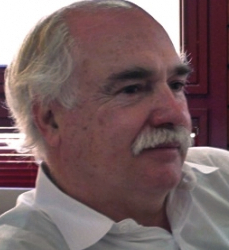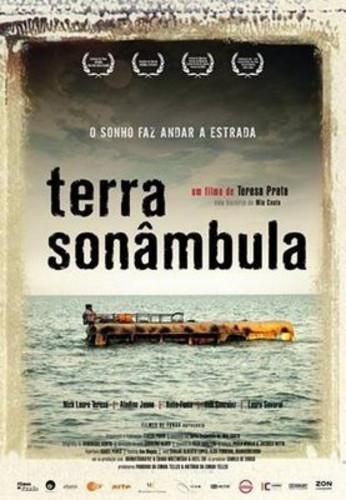No dia 23 de outubro, os alunos do PRT320 e PRT420 tiveram a oportunidade de ouvir e colocar questões ao escritor G.M. Tavares. O escritor falou, de forma acessível, para o nosso público, composto por alunos de Português Segunda Língua. Leitura como primeiro passo para a escrita, a leitura indispensável dos clássicos e a obrigatoriedade de ouvir a opinião dos professores na seleção de títulos entre os milhões existentes.
Notas da conversa com o escritor G.M.Tavares:
O que é a escrita? O que é ser escritor?
Nao há ligação entre matéria e palavra. Por exemplo: a palavra cão não morde. A palavra mesa não serve para colocar nada em cima. O alfabeto nada mais é do que uma combinação de traços. O traço é comum à literatura, ao desenho e outras artes. A língua é muito abtracta, são traços, é quase um código morse. Como é que eu com traços e formando palavras consigo fazer ver, acreditar, sentir? É muito complexo. O leitor conseguir ver é que faz a qualidade da escrita. Quando o leitor se emociona ao ler um livro, estamos a emocionar-nos com traços. O meu livro O senhor Valery é uma homenagem a vários escritores, artistas. São histórias muito curtas. Tento escrever o mais sintéticamente possível, oito palavras em vez de quinze, se for possível. O meu objetivo é diminuir ao máximo o número de palavras dizendo o que quero dizer. Escrevo primeiro a “massa bruta”. Depois, passadas semanas, de 4 ou 5 páginas reduzo tudo para metade duma página. Às vezes demoro 3 semanas, um mês a rever as 10 páginas que escrevi à mão. Ao fim desse mês, em vez de 10 páginas, tenho ½ página. O que me interessa é concentrar a energia toda do texto em poucas palavras. Creio que isso contribui para maiores interpretações da leitura. No livro O Senhor Brecht as histórias são muito curtas, resultado de muito trabalho. Meia página pode dizer muito.
(Leu O Desempregado/ O cantor/ O homem mal-educado)
Eu acho que se deve intervir politicamente de forma literária. No texto Avaria eu intervenho sobre a pena de morte. Eu acredito que através da caricatura, da ironia se pode intervir, se pode pôr em causa muita coisa.
(Leu O estrangeiro/ O mestre/ A revolta)
No estrangeiro, por exemplo, pode comparar-se com o professor de línguas. Gosto dos meus textos muito pequenos que podem ser usados como debate. Se se conseguir encurtar o texto, fica muito mais para interpretar.
Porque levo tanto tempo a publicar?
O próprio tempo ajuda a selecionar. O que me parece muito bom hoje, daqui a uma semana ou um mês já me parece menos bom. Escrevo, ponho numa gaveta e daqui a 3 ou 4 anos volto ao texto. Encontro muitas coisas que já não gosto, corto, seleciono.
Geralmente quando acabamos de escrever um texto achamos muito bom. Temos que criar distância, ser críticos de nós mesmos. Pôr tempo no meio é essencial. Tento ser leitor e ver com olhos críticos e corrigir.
A literatura não é como o teatro, permite não fazer uma estreia antes do tempo.
Há quem diga que não se deve escrever quando se está apaixonado. A emoção não deixa ver. Quando se escreve poesia debaixo de emoção e se dá a ler o mesmo texto a outra pessoa, geralmente essa nada vê daquilo que pensamos estar a transmitir. Quando se sente e se escreve, não se tem sentido critico.
Exemplo: o diário é um registo escrito importante para a pessoa. A escrita literária é para os outros, a pessoa não está na mesma situação. Ou a pessoa quer escrever paar si - e o diário é bom exemplo, - ou para os outros, quer perturbar os outros, são coisas completamente diferentes.
Os surrealistas defendiam a escrita espontânea, automática, quase nada ficou do surrealismo a não ser na pintura.
Ler – por onde se deve começar?
Deve começar-se por textos simples, i.e., que não utilizem palavras complexas. Eu gosto de O Senhor Valery porque mesmo uma criança pode entender.
Para mim a leitura está associada ao prazer, é quase uma excitação. Está associada a toque. Eu leio sempre de lápis na mão. Não consigo ler sem um lápis. Ler não é passividade, para mim é uma atividade. Para mim, não é tempo passivo. Fisicamente eu leio debruçado soobre o livro. Quando estou cansado eu não leio, vejo televisão.
Se a pessoa está a ler um livro que não lhe dá prazer, deve deixar esse livro e passar a outro.
Deve ler-se os clássicos. Se o livro é bom e a pessoa não quer ter o trabalho de ler, está a ignorar as várias gerações. Exemplos: Crime e Castigo, Alice no Pais das Maravilhas, A Montanha Mágica, O grande sertão.
Deve ouvir-se as gerações anteriores e confiar na opinião daqueles que continuam a selecionar esses livros.
Em tantos milhões de livros para escolher ler, é bom ouvir a opinião de outros. Deve poder escolher-se à vontade mas dentro de uma lista proposta por alguém que lê e pode saber mais. Não se perde tanto tempo.
O que é um livro?
Não é uma capa. Um livro é algo que trata a lingua de forma diferente, é exigente, muda a velocidade da leitura. Se compararmos com um artigo de jornal, por exemplo, o texto literário tem que ter outra natureza. Um livro deve inaugurar um mundo qualquer diferente.
Há uma diferença entre informação e cultura. A internete por exemplo dá a informação imediata, mas a cultura ensina a relacionar. A interneta com os “links” destrói a ideia do livro. O livro ajuda-nos a fazer ligações, ajuda à concentração.
A palavra concentração vem de “com um centro”. Só pode haver um centro, a leitura é um processo de concentração. A leitura eletrónica muda os centros, faz perder a concentracão.
Quando e como escrevo?
Quando escrevo, desligo a net, o telemóvel, fecho a porta, estou 4 a 5 horas fechado no meu “bunker”, os meus pais por exemplo quando querem comunicar comigo mostram a sua compreensão e amor, colocado-me papéis escritos debaixo da porta. Fico num estado meio hipnotizado, de zombie, vou tomar café à cozinha, mas nao falo com eles, com ninguém.
Geralmente na primeira hora não consigo escrever nada, só à terceira hora começa a sair qualquer coisa. O ritmo é muito importante, tem que se ter tempo, horas seguidas para se escrever.
O papel do livro é importante, o brilho é mais difícil de ler, no écran há um brilho que obriga a parar.
Escrever exige tempo. Eu não acredito que quem queira mesmo escrever não o encontre. Tem que se dizer não a muitas coisas. Tem que se dizer não às pessoas de quem gostamos muito.
Agora há mais tempo. Basta pensar no tempo dos nossos avós, o tempo que precisavam para cozinhar por exemplo. É injusto dizer que não temos tempo se pensarmos nas gerações dos nossos avós. Eu não concordo que a vida seja mais ocupada agora.
Como é que sabe que o que se escreve tem valor? Porque demorei tanto tempo a publicar?
Mandar o livro concorrer a prémios é uma boa maneira. Os amigos e familia vão sempre achar que o que escrevemos é bom. Temos que ser criticos de nós mesmos. Temos que deixar passar tempo. Só me atrevi a publicar quando me senti preparado para o que pudessem dizer. Muita pessoas publicam um livro e nunca mais publicam nada. Umas vezes porque foram tão elogiados que não se atrevem a escrever outro com medo de não ser capaz de repetir a proeza. Outros porque foram tão criticados que perdem a confiança.
Eu não concordo com aqueles criticos muito exigentes que acham que é preciso destruir para estimular a pessoa a fazer melhor. Acho criminoso destruir o sonho de uma pessoa que quer escrever. Devemos ser generosos para que a pessoa não abandone a escrita. Uma pessoa que tira o sonho a outra devia ser presa.
É importante ler? Que livros mais me influenciaram?
Ler é a primeira parte, escrever é a segunda,
Gosto de escritores do imaginário e também dos realistas. Algusn escritores e artistas que me influenciaram: Virginia Wolf, Voltaire, Pessoa, Musil, Kafka, Clavino, Borges. Eu leio, leio todo o tempo. Tenho milhares de livros e leio sempre.
Tragédia literária é o que muitas vezes acontece com a poesia. Fernando Pessoa é a antītese da poesia emocional.
Os professores deviam dar aos alunos uma lista de livros obrigatórios.
(Contou o episódio do irmão a fazer doutoramento em Matemática Aplicada em Harvard cujo professor na primeira aula deu uma lista de livros clássicos a todos os alunos. Um atreveu-se a perguntar a razão de ter que ler aquelas obras literárias se eram alunos de Matemática e o professor respondeu que se recusava a falar com pessoas que não tinham lido pelo menos aqueles livros.).
Viagens e leitura mudam a cabeça das pessoas. Se a pessoa não viaja e não lê, passados dez anos, está com a mesma cabeça.























